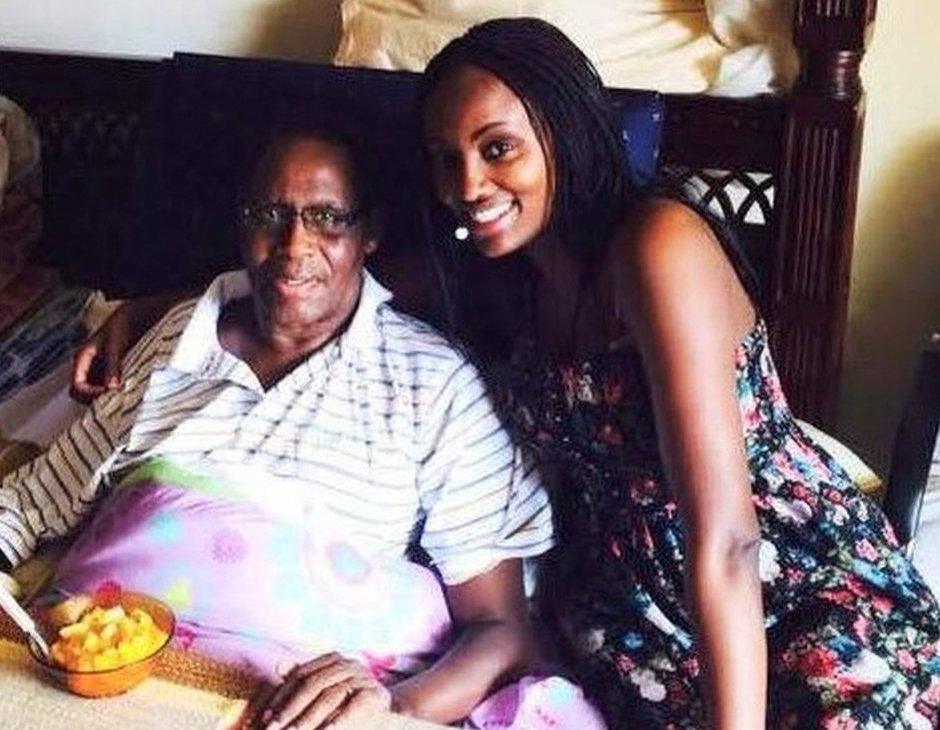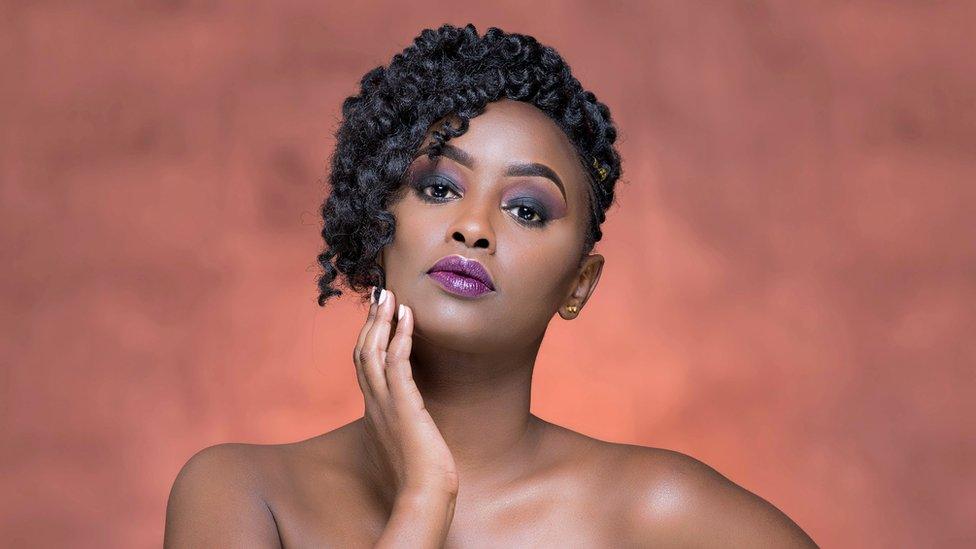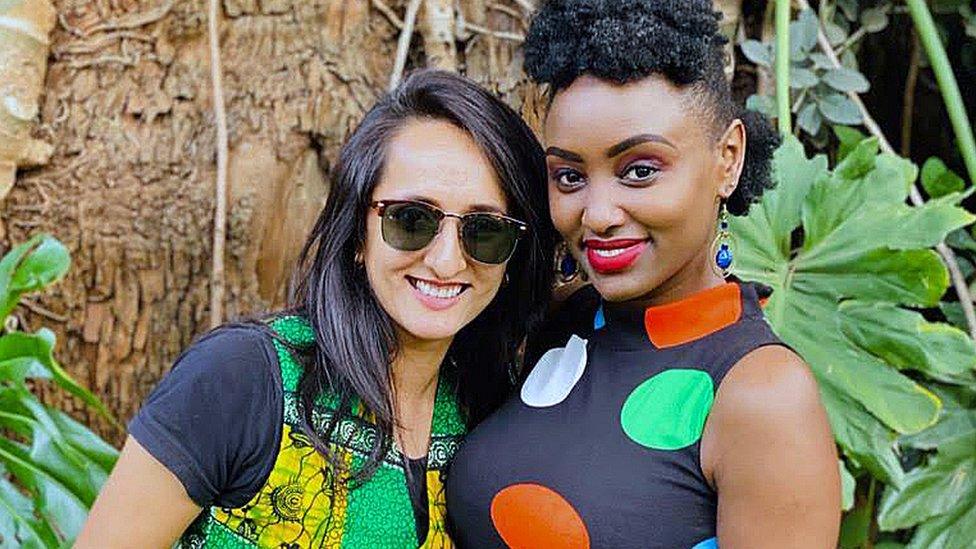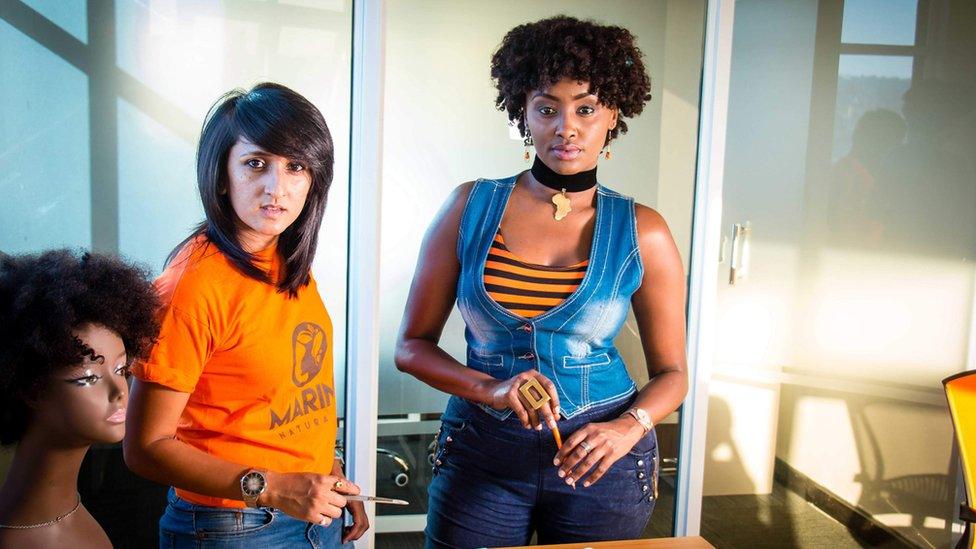Marini Naturals: The haircare business that reaches 12 countries
- Published
'The best time to start your business is... now!'
They say that when a woman gets a new hairstyle it means that there is something big going on in her life.
For Michelle Ntalami back in 2013, the big thing was sadly that her father was gravely ill with cancer.
And when his chemotherapy treatment made him lose all his hair, she decided to shave hers off in solidarity.
Michelle, now 35, also vowed that she would start to "live more healthily and naturally" to try to reduce her own future risk of being diagnosed with the condition.

Michelle Ntalami and her father Edward

So, as her afro hair grew back, she decided that she would stop using the chemical treatments that most women in Kenya's capital Nairobi use to straighten their hair.
Instead, she would only buy naturally-made haircare products for natural afro hair. Unfortunately these weren't available to buy in Kenya at the time, so Michelle started to order them from the US and Europe.
As this was very expensive, she started to make her own shampoos, conditioners, and other products, in her bathroom, using ingredients such as avocado, egg, rosemary water, and aloe vera.
"When I gave them to friends to test, they just loved them," she says. "I realised that selling natural hair products could become a viable business."
Today her Nairobi-based company - Marini Naturals - sells 50,000 bottles and tubs a month across 12 countries, 10 in Africa, plus Turkey and France.

Michelle says she wanted to create a haircare line specifically for African consumers
While Michelle says that her parents taught her the importance of "working hard and following your dreams", they were also able to give her an upbringing far more comfortable than most Kenyans enjoy.
Her father, who passed away in 2014, was a businessman, and the boss of Kenya's financial regulator, the Capital Markets Authority. Meanwhile, her mother worked for the United Nations.
"My parents were always very driven in terms of career and education," she says.
After school, Michelle got a degree in design and communications from the University of Nairobi, and then spent time in Italy where she got a master's in interior design from the Florence Design Academy in Italy.
Returning to Kenya, she first worked for an IT company. She then joined the pan-African advertising agency Sanad Africa.

Marini is a Swahili word which means 'naturally beautiful'
However, she had long wanted to set up her own business, and while at Sanad she launched her own branding agency, called Brandvine Group. She ran this together with her best friend Niyati Patel, who would become her co-founder at Marini.
"I always wanted to start my own company, because I love to build something up from scratch," says Michelle.
Launching Marini in 2015, Michelle says she soon realised that she faced "a heck of a job" to convince Kenyan women to give up their chemical hair straighteners, and instead embrace their natural curls.
She says that she was fighting against the accepted wisdom. "Most cosmetic scientists claimed that the African market wasn't ready for natural hair products, as most African women were still convinced that their natural hair couldn't be beautiful," she says.
But determined to both change matters, and make a success of Marini, Michelle decided to make some videos, and launch a campaign on YouTube. Using 30 models she showcased more than 50 natural hairstyles created using the company's products.

Michelle Ntalami and Niyati Patel have sought to make moisture the key to their haircare products
"It became a huge success," she says. "People all over the continent shared our videos on social media, and our YouTube tutorials became an important part of our marketing strategy."
What helped to boost sales was that Michelle was able to say that all the ingredients were made in Africa, such as coconut oil from Kenya, shea butter from Uganda, and natural fragrances from South Africa. However, the packaging is from China, as Michelle says that, disappointingly, she was not able to find bottles and tubs of sufficient quality within Africa.
Already selling Marini Naturals outside of Africa in France and Turkey, Michelle now has her eye on further global expansion. She says that there is growing interest in her products as more men and women of African descent decide to give up straightening their hair.
"Thanks to this increasing global demand we now want to scale Marini [more into] Europe, and into the US," she says.

This story is from a new mini-series called Paths to Success
The company also plans to start exporting its new range of skincare products.
Michelle says that while she gets her biggest satisfaction from positive customer feedback, her late father is often in her thoughts.
"I miss him very much," she says. "Maybe Marini Naturals was his gift to me before he left.
"To be able to translate that into a product that is changing lives of millions of women, men and children around the world is extremely fulfilling."